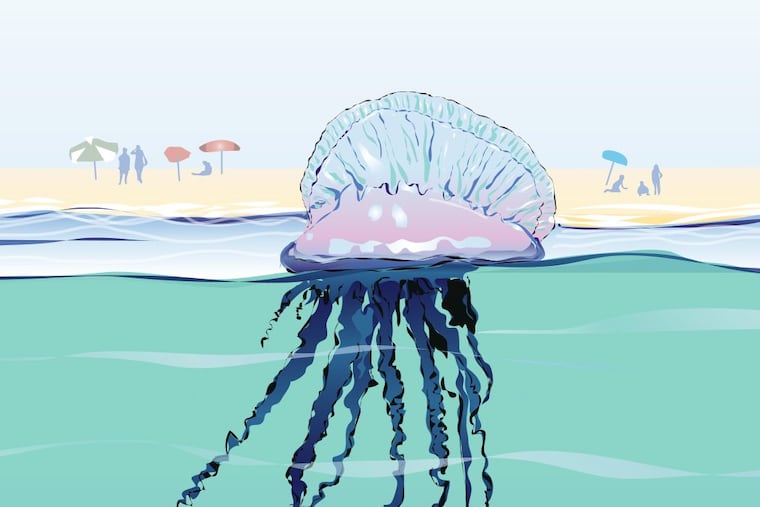‘Thousands and thousands of little stinging cells.’ Dangerous Portuguese man-of-war spotted in Wildwood
A venomous Portuguese man-of-war was spotted on the shore in Wildwood on July 5.

It was a typical summer evening in Wildwood when all of a sudden, the night was interrupted by a gelatinous creature mangled in the sand, its tentacles tangled up with one another.
Christine Perna Burns of Bridgeton, N.J., came face to face with the critter on July 5, and promptly posted a photo on social media.
Burns' encounter with the venomous marine organism is among the state's first recorded spottings of the Portuguese man-of-war this year. What some may mistake as a bothersome but beautiful jellyfish can, in rare instances, kill victims who get caught in its winding tentacles, said Paul Bologna, director of the Marine Biology and Coastal Sciences Program at Montclair State University.
"In open water, if you try to swim away, you get wrapped up in the tentacles, and you can get a massive dose of venom," he said. "On the shore, they can sting you, but it's unlikely to be a fatal dose."
The men-of-war are typically found in tropical climates like the Caribbean, Bologna said. They travel by simply drifting with the natural currents, so in years when the Gulf Stream, a current that runs from the tropics to the North Atlantic, hugs particularly close to the United States, one can expect to catch at least a few along the East Coast.
"They just ride the current," Bologna said. "Some years, it's like a constant conveyor belt of these things across the Atlantic."
Portuguese men-of-war are a kind of siphonophore, a colony of clones working in unison to properly function, "like a bee colony," he said.
Man-of-war sightings have been reported across South Jersey in the last few weeks, Bologna said, but not in Cape May, Ventnor, or Ocean City, according to beach patrols in those cities.
"They're a routine visitor to the Shore," said Lawrence Hajna, spokesperson for the New Jersey Department of Environmental Protection. "It's really not a surprise."
Everyone reacts differently to man-of-war poison, according to Matthew Landau, professor of marine science at Stockton University. Some might feel a slight sting, he said, while others might experience dangerous allergic reactions or painful welts and need to seek medical attention.
"These aren't bees where they sting you once and that's all the venom they have," Landau said. "These have thousands and thousands of little stinging cells. … Some people will go into shock."
Landau recommends that anyone stung by a man-of-war get out of the water, remove any remaining tentacles, and wash with salt water, not fresh water.
The Portuguese man-of-war gets its perhaps exaggeratedly threatening name from the appearance of its gas sac, which, when floating, looks to some like a warship.